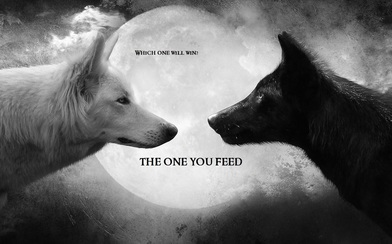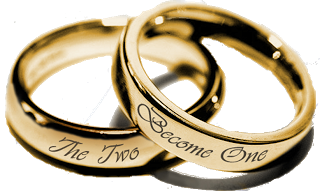
I spend a great deal of time helping my clients understand that they may have all kinds of external circumstances to cope with, many simultaneous thoughts and feelings, and all kinds of complicated dynamics with others. And yet, it is in their relation to "Self" that they can "choose"the values, attention and actions that shape, manage, and impact how experience occurs for them.
One of my favorite parables points out what is at the core of self relations therapy, the ability to choose!
An old Cherokee is teaching his grandson about life. “A fight is going on inside me,” he said to the boy.
“It is a terrible fight and it is between two wolves. One is evil – he is anger, envy, sorrow, regret, greed, arrogance, self-pity, guilt, resentment, inferiority, lies, false pride, superiority, and ego.” He continued, “The other is good – he is joy, peace, love, hope, serenity, humility, kindness, benevolence, empathy, generosity, truth, compassion, and faith. The same fight is going on inside you – and inside every other person, too.”
The grandson thought about it for a minute and then asked his grandfather, “Which wolf will win?”
The old Cherokee simply replied, “The one you feed.”
The wolf you choose to feed represents the "part" of self you can "choose" to give power to at any moment. Each human being has the power to shape their own experience of life through the processes of understanding the relationship with one's self and all its parts. There is a part of you gathering information from senses, a part deciding what to focus on, a part that creates thoughts and ideas and a part that listens and ascribes meanings to those ideas, sensations and experiences. We all have inner dialogues amongst the many parts within our self. There also seems to be a distinct processing part of the self that affords us the ability to choose which thoughts, beliefs, ideas and feelings to give attention, value and action to. A healthy life of coping and managing experience may come from mastering the skills to distinguish the parts of self and use the "part that chooses" to create harmony and cooperation within our selves.
One of my favorite parables points out what is at the core of self relations therapy, the ability to choose!
An old Cherokee is teaching his grandson about life. “A fight is going on inside me,” he said to the boy.
“It is a terrible fight and it is between two wolves. One is evil – he is anger, envy, sorrow, regret, greed, arrogance, self-pity, guilt, resentment, inferiority, lies, false pride, superiority, and ego.” He continued, “The other is good – he is joy, peace, love, hope, serenity, humility, kindness, benevolence, empathy, generosity, truth, compassion, and faith. The same fight is going on inside you – and inside every other person, too.”
The grandson thought about it for a minute and then asked his grandfather, “Which wolf will win?”
The old Cherokee simply replied, “The one you feed.”
The wolf you choose to feed represents the "part" of self you can "choose" to give power to at any moment. Each human being has the power to shape their own experience of life through the processes of understanding the relationship with one's self and all its parts. There is a part of you gathering information from senses, a part deciding what to focus on, a part that creates thoughts and ideas and a part that listens and ascribes meanings to those ideas, sensations and experiences. We all have inner dialogues amongst the many parts within our self. There also seems to be a distinct processing part of the self that affords us the ability to choose which thoughts, beliefs, ideas and feelings to give attention, value and action to. A healthy life of coping and managing experience may come from mastering the skills to distinguish the parts of self and use the "part that chooses" to create harmony and cooperation within our selves.

Early on in my career as a therapist I learned how important it is to have insight about self relations in helping others. After a beloved childhood neighbor's battle within her "self" (manifested as alcoholism), resulted in her death, I wrote this poem to remember to care for my-"self" while helping others.
Everyone talks to themselves and yet most people don't consider that there is a very real and powerful relationship that needs as much attention care and effort as all the others. Take some time to learn about your inner dialogue and gain some insight about how to choose which thoughts and ideas to give weight to and which ones to detach from.
Utilizing practices that allow us to become skillful in the act of intentionally choosing what, when and how to attach or detach within our inner dynamic creates an internal locus of control for us to steer through the external circumstances we encounter. Choosing which thoughts and feelings to give attention to and/or act upon won't necessarily eliminate negative or opposing ones. However, without feeding them with attention, value or behaviors those other ones will occur more neutral. In NLP (neurolinguistic training) approaches we often teach clients how to de-intensify negative thoughts or feelings. In mindfulness and meditative practices thoughts and feelings occur but as one lets go of attachment to them they occur neutrally.
Here is a link to article with some practical ways to improve your self relationship.
http://psychcentral.com/blog/archives/2013/01/13/6-ways-you-can-have-a-healthy-relationship-with-yourself/
Some Theoretical Background.
I have practiced self relations psychotherapy with my clients since I was an interning therapist in the early 90's. I was an NLP practitioner and participated in NLP workshops like Tony Robin's "Fire Walk" where I happily tossed my shoes to walk bare foot over burning coals to find my own inner empowerment source. However, it was during my training in Ericsonian model to utilize clinical hypnosis in my work as a therapist, that I discovered a deeper connection to the evolving discourse surrounding self relations theory. I learned that the concepts from Carl Jung, Milton Erickson, Ancient Buddhist teachings, countless mind/body practices and later the work of Stephen Gilliam were integrated into the theoretical core of what self relations therapy has become.
Here is a link to an article about the history and founding fathers of the self relations therapeutic concepts.
http://seishindo.org/foundations-the-ericksonian-legacy-and-self-relations-psychotherapy/
Utilizing practices that allow us to become skillful in the act of intentionally choosing what, when and how to attach or detach within our inner dynamic creates an internal locus of control for us to steer through the external circumstances we encounter. Choosing which thoughts and feelings to give attention to and/or act upon won't necessarily eliminate negative or opposing ones. However, without feeding them with attention, value or behaviors those other ones will occur more neutral. In NLP (neurolinguistic training) approaches we often teach clients how to de-intensify negative thoughts or feelings. In mindfulness and meditative practices thoughts and feelings occur but as one lets go of attachment to them they occur neutrally.
Here is a link to article with some practical ways to improve your self relationship.
http://psychcentral.com/blog/archives/2013/01/13/6-ways-you-can-have-a-healthy-relationship-with-yourself/
Some Theoretical Background.
I have practiced self relations psychotherapy with my clients since I was an interning therapist in the early 90's. I was an NLP practitioner and participated in NLP workshops like Tony Robin's "Fire Walk" where I happily tossed my shoes to walk bare foot over burning coals to find my own inner empowerment source. However, it was during my training in Ericsonian model to utilize clinical hypnosis in my work as a therapist, that I discovered a deeper connection to the evolving discourse surrounding self relations theory. I learned that the concepts from Carl Jung, Milton Erickson, Ancient Buddhist teachings, countless mind/body practices and later the work of Stephen Gilliam were integrated into the theoretical core of what self relations therapy has become.
Here is a link to an article about the history and founding fathers of the self relations therapeutic concepts.
http://seishindo.org/foundations-the-ericksonian-legacy-and-self-relations-psychotherapy/


 RSS Feed
RSS Feed
